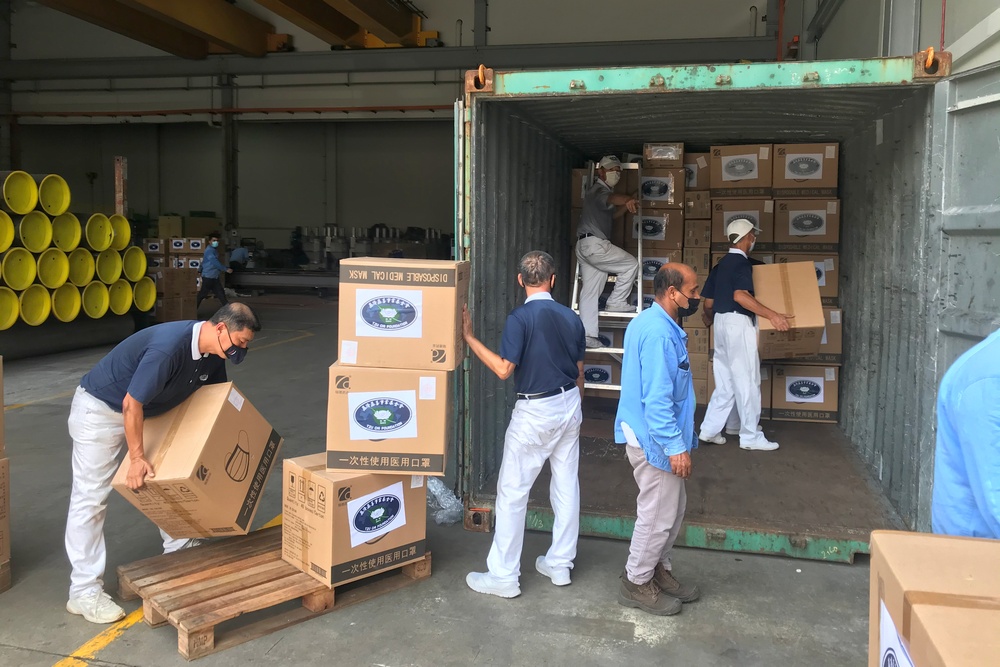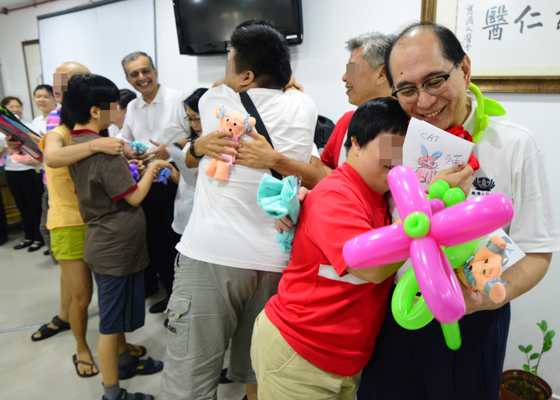
Dr. Lin Chin-Lon (second from left) representing Tzu Chi and Mr Liak Teng Lit from Alexandra Health System sign an MOU of health promotion and green health care. (Photo by Lin Meng Cai)
Taking advantage of the arrival of healthcare teams into Singapore for the international TIMA conference, the Khoo Teck Puat Hospital (KTPH) and Taiwan’s Tzu Chi Foundation co-organised the “HPH & Environment Symposium” to further their twin causes of health promotion and environmental protection.
On the morning of 8 March 2015, Dr. Lin Chin-Lon CEO of Tzu Chi’s Medical Mission, Mr Low Swee Seh CEO of Tzu Chi Foundation (Singapore), together with others, first participated in the “Singapore World Water Day” event which the hospital had co-organized with the grassroots community and other agencies, engaging in a brisk walking and litter-picking activity before heading towards the hospital.
Hospitals from Singapore and Taiwan Sign MOU
Before the start of the symposium, representatives from Tzu Chi and Alexandra Health System signed an MOU to cooperate on research, healthy promotion and green healthcare.
Associate Professor Muhammad Faishal Ibrahim, Parliamentary Secretary for the Ministry of Health and Transport, and Members of Parliament from the Yishun Group Representation Constituency were present to witness the signing ceremony, together with 170 other participants from across the medical and academic fields, Tzu Chi volunteers and KTPH staff.
As the main organizer of the symposium, Tzu Chi shared the example of the Tzu Chi Hospital in Dalin as well as other related topics so that symposium attendees could appreciate the relationship between health and being environmentally friendly. Dr. Lin, chairperson for the current symposium pointed out in his opening speech that though resource saving measures should start from the level of individuals and family units, the hospital is just like a big family that consumes a lot of water and energy. It also produces a large amount of waste, some of which may be hazardous in nature.
Hospitals are places for treating the sick; if they do not adopt green practices, patients would indirectly suffer from the negative impact produced, and the environment too, would be harmed.
Next, CEO of KTPH Mrs Chew Kwee Tiang shared the motivation behind the establishment of a green hospital. The KTPH team had studied the Tzu Chi Hospital model and decided to adhere to three principles. Firstly, it was planned for the hospital to be built amidst a garden so that the building would be shielded by greenery, creating a calm environment conducive for patient recuperation.
Secondly, the hospital was to be a place for promoting a healthy lifestyle to the masses, advocating healthy eating, regular exercise, maintaining a happy state of mind etc. Thirdly, building community cohesiveness among the neighbouring residents, encouraging them to make the first move to protect the environment and to create a warm society for everyone was also part of the plan.
Having the Heart to Save Our Earth
Merci V. Ferrer, invited speaker and Asia Director of Health Care Without Harm(HCWH) stressed in her talk that in the process of promoting health and improving the environment, the support of management and the purchasing department is key to ensuring the success of environmental sustainability efforts. The management of chemicals and medicines used by the hospital too, will affect the health of the hospital’s environment.
Ms Ferrer urged hospitals to together drive environmental sustainability efforts, that hospitals can transform themselves from high resource consumption entities into environmentally friendly ones. As founder of HCWH Gary Cohen said, we can no longer continue to support healthy people on a sick Earth.
Mr Chen Fan-Lun, manager from the Industrial Technology Research Institute illustrated with statistics how carbon dioxide emissions have been increasing over the years. A comprehensive electrical power monitoring system is the most effective way of improving energy efficiency and slowing down the effects of global warming. Other methods include the use of clean energy alternatives such as solar electricity generators. In such a manner, it is hoped that carbon emissions can be reduced to 13% by the year 2020.
The superintendent of the Tzu Chi Hospital in Dalin, Dr. Lin Ming-Nan, introduced to the audience how his hospital was able to implement environmental awareness by showing them a short video clip of staff engaging in activities to reduce, reuse and recycle, even as the hospital educates, rewards and encourages the correct behaviors. In so doing, conservation of energy and reducing carbon emissions become a part of their daily lives.
Chairman of Alexandra Health System Mr Liak Teng Lit gave a detailed introduction into how the KTPH was conceptualised. It’s predecessor, the Alexandra Hospital had been infused with new life in just three years after green measures were introduced. When the Ministry of Health made plans for the hospital to be moved to Yishun, the management team embarked on their own plans to build a green hospital.
Mr Liak also mentioned that in future, mankind will face a very serious shortage of energy, water and food, thus, he hoped that the KTPH would become a model hospital that can boast of reduced carbon emissions and energy consumption. Numerous “green advisories” can be seen throughout the hospital and they include the poster which is a leaf taken out of Tzu Chi’s book as it exhorts one to use the stairs in favour of the lifts. The KTPH even has a rooftop vegetable garden that is tended by staff of the hospital as well as volunteers. Mr Liak commented that pertaining to operating an environmentally-friendly hospital, there are still areas in which they can learn from Taiwan.
Environmentally Friendly Meals in Green Hospitals
The sumptuous vegetarian meal that was served up after the symposium ended impressed the participants, and was the result of the joint efforts of Tzu Chi commissioner Joyce Goh and the KTPH central kitchen cooks. Goh had previous experience as a professional chef, and a few days before the symposium, she had surveyed the venue and was engaged in menu discussions with the KTPH cooks.
KTPH’s Chief Dietitian Gladys Wong had often pondered how to introduce healthier food into the hospital’s menu, and was very happy to have the opportunity to exchange ideas with Goh. She commented that it was not easy to push for increased vegetable consumption and less meat intake in the hospital. However, seeing how the vegetarian menu at the symposium was so well received, she felt very encouraged and hoped to be able to initiate “Meatless Mondays” at the hospital and gain the support of the other staff. She aspires to one day see the initiative take off in the whole hospital and thus achieve the three goals of health, environmental protection and economy.
In the afternoon, 32 overseas symposium participants arrived at the KTPH for a learning visit, with the intention to bring back green concepts which can be implemented in their own country. A participant from Yunnan, Fan Li Hua was seen taking many pictures of the KTPH’s environment and facilities. She expressed how lighthearted she felt the moment she stepped in, saying that patients would feel their ailments reduce by half in such environs even before receiving medical treatment.
With a cool breeze blowing, a bridge, flowing water, greenery and students studying amidst the sounds of birds in the background, one could not imagine that this was the grounds of a hospital. The hospital also employs the use of natural lighting within its premises and various types of plants and flowers decorate the different levels even as they help shield against the heating effect of the sun’s rays.
Dr. Fan Rui Bing was full of praise for the rooftop vegetable garden, which was tended to by staff and volunteers from the community. The hospital had invited volunteers who had knowledge of organic gardening to teach staff how to plant vegetables, and this was a way in which they could be active, stay healthy and reduce carbon emissions.
With the serious problem of a greenhouse effect and the resulting global warming threatening to unleash a huge negative impact on humans, the symposium aimed to give participants the impetus to spur on environmentally friendly initiatives within their own medical communities and hopefully, progress towards creating a green hospital environment.

On 8 March 2015, Tzu Chi hospital superintendents Dr. Lin Chin-Lon and Dr. Lin Ming-Nan, and Tzu Chi volunteers together with others, made their way to Yishun where they took part in an environmentally friendly litter-picking exercise. (Photo by Chua Teong Seng)

Group photograph taken of grassroots leaders, Tzu Chi volunteers and residents at the conclusion of the “Singapore World Water Day” event. (Photo by Lin Meng Cai)

Dr. Lin pointed out during his welcome speech that hospitals co-exists closely with the environment. If they do not adopt green measures, the large consumption of resources and some of the toxic waste produced will harm both the environment and patients’ health. (Photo by Chua Teong Seng)

The CEO of KTPH Mrs Chew Kwee Tiang shared that during the conceptualization stage of building a green hospital, they had learnt from the experience of the Tzu Chi hospitals. (Photo by Chua Teong Seng)

Chairman of Alexandra Health System Mr Liak Teng Lit gave an introduction into how the KTPH green design features were conceptualized and implemented. He hoped that it would become a green role model for other hospitals. (Photo by Chua Teong Seng)

The symposium ended with a discussion where speakers and participants shared their views and experiences. (Photo by Chua Teong Seng)

Tzu Chi commissioner Joyce Goh (second from right) having a discussion with the KTPH’s cooks as they prepare for the day’s vegetarian banquet. (Photo by Chua Teong Seng)

Fan Li Hua (centre), a participant from Yunnan, China, took many pictures of KTPH’s greenery. (Photo by Chua Teong Seng)

The rooftop organic vegetable garden at KTPH is tended by hospital staff and volunteers from the community. (Photo by Lin Meng Cai)



